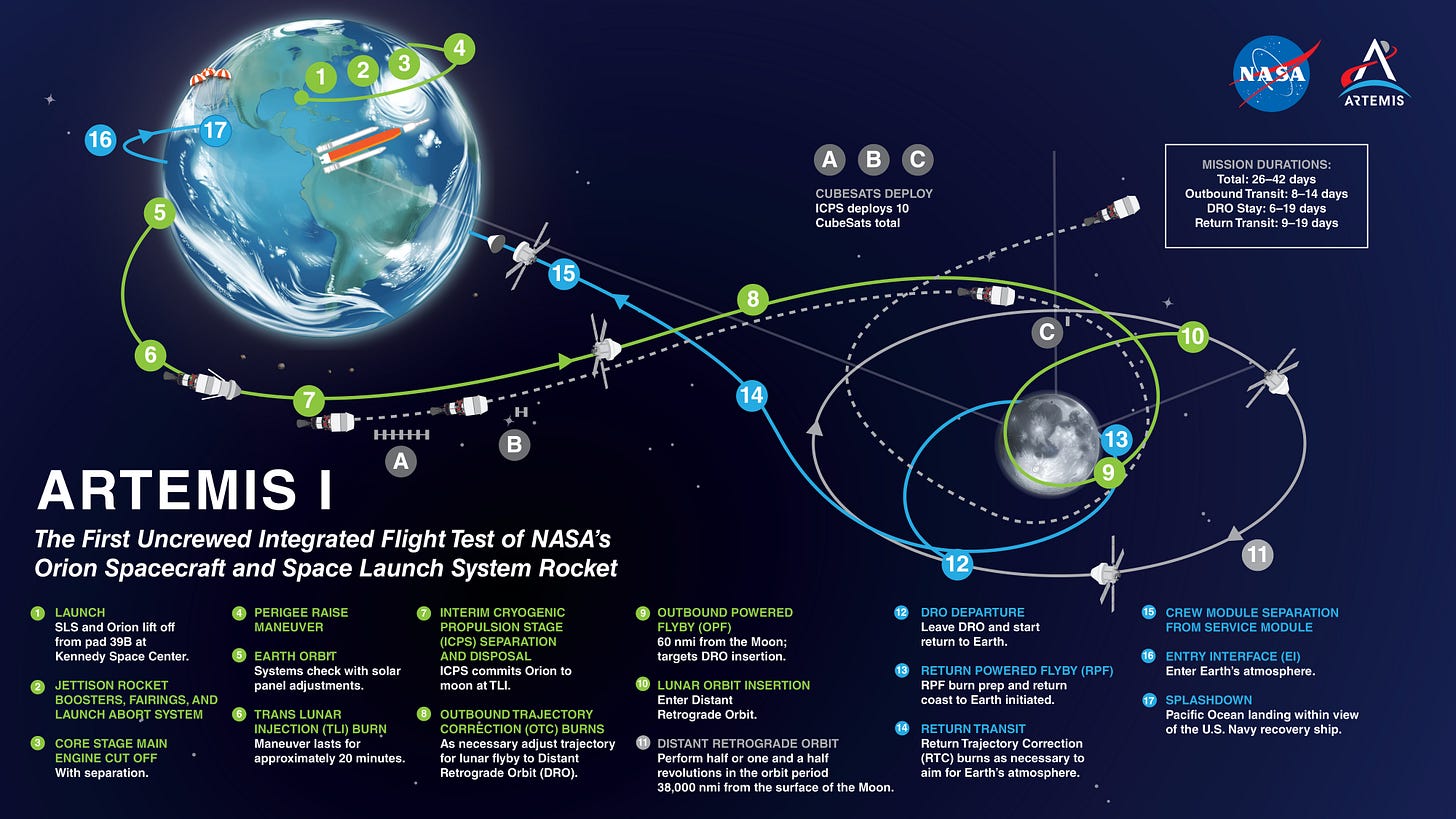(Artemis 1 mission map from Wikipedia)
Last Wednesday morning NASA at last launched Artemis 1. Today she is due to fly less than a hundred miles above the surface of the moon. An engine burn is scheduled to put her Orion capsule in a retrograde orbit around the moon until 1 December, when another burn is due to push the capsule toward splashdown on Earth in the Pacific Ocean. This time Orion is crewed only by inanimate dummies to measure physical stresses.
If the mission goes well enough, Artemis 2 will take a human crew around the moon and back in 2024, and the following year Artemis 3 will take a human crew for a lunar landing.
NASA has ambitions to establish a base on the moon in the next few years at which astronauts can live and work.
Why?
Because we still don’t know enough about living off-planet for long periods of time, and we have to fill in the gaps in our knowledge before anyone can go to Mars.
Why go to Mars when Earth and every living creature on it has so much trouble?
Because Earth and every living creature on it has so much trouble. I’m thinking of more than the sci-fi notion of establishing colonies offworld so that we no longer have all our eggs in one planetary basket.
Whenever we venture up toward the stars, we learn things about ourselves and our planet that we wouldn’t or couldn’t learn any other way. We’ve been unable to predict what we’re going to learn. If we could predict it, we wouldn’t need to go up there. We would just figure out the keys to everything without getting off the sofa. Nope, we have to venture out and see how it all looks from such a radically different perspective.
If we hadn’t gone up there, how much longer would it have taken to come up with remote monitoring of ICU patients, pacemakers, ubiquitous computing (such as in the phone in your hand), GPS (satellite navigation), and so much more? Would we have even a glimmer of understanding about why our weather is getting so strange? How would we learn things about the way our bodies work that we couldn’t learn without getting some people into a microgravity environment for a while (which we think of as weightlessness)?
All of our crewed space flights so far have been short compared to what it will take to go to Mars. Going from low Earth orbit to Mars is too big for a single step, and it’s too different.
A base on the moon makes sense as our next step. We’ve discovered microgravity does us harm, and some of that harm persists long after the flight is finished. The moon’s gravity is a little less than half as much as Mars and about 1/6 as much as Earth. It isn’t much, but it’s very unlike microgravity. Astronauts living and working on the moon for months at a time will find out how we fare in reduced gravity, which we hope will be much better than how we fare in microgravity.
We’ll have to find ways to shield astronauts better against radiation. Our spacecraft don’t shield them anywhere near enough. Maybe they can tolerate it for a trip, but they shouldn’t have to live in a shower of radiation all the time. Both the moon and Mars don’t have a protective blanket of atmosphere thick enough to reduce radiation. If we bury our moon base under a layer of dust, will that provide enough shielding? Can we do the same on Mars?
A moon base will give us more practice at trying to make a sustainable closed-loop environment that we can live in. We aren’t good at it yet. We still have to send fresh supplies and bring back rubbish, so we need to work on it close to home. Mars isn’t close at all. Earth isn’t quite a closed environment, but if we can learn how to make one, we will understand more about what the Earth needs to correct the imbalances we’ve created or magnified.
No robotic mission can do this. We have to send humans.
There are people who don’t see the point in sending people to outer space. There are people who believe the money behind those missions would be better spent on problems currently happening in the world. Compared with the money sloshing around the globe, funding for NASA and the European Space Agency and other space exploration programs is not that much. We now have decades of experience that shows space exploration produces unexpected gains, benefits that change our capabilities, sometimes adding abilities we didn’t even imagine possible.
COP27 just ended with a landmark agreement or two, but essentially an admission that we’re going to breach what we used to regard as a temperature rise we must not exceed. The goal of limiting global warming to 1.5 degrees Celsius is pretty much lost…
Unless we can learn something new to help us find a path to saving ourselves that we can’t even see now.
We’ve gotten marvelous new capabilities from space programs before. There’s no guarantee we’ll get the new abilities we need from this new exploration initiative. But as of COP27, we aren’t willing to invest the much larger amounts that would be needed to rein in global warming with the knowledge we have now.
So that leaves us watching Artemis, hoping the next round of unexpected gains from space travel will be what we need.





Not sure if you've heard the news from Colorado. It's horrendous and infuriating. https://www.cnn.com/2022/11/20/us/colorado-springs-nightclub-shooting-what-we-know